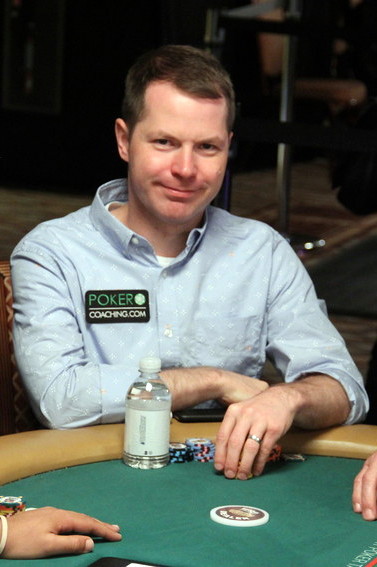






Poker Strategy With Jonathan Little: A Spot You Don’t Want To Slow PlayDevelop Your Poker Skills And Learn How To Crush Games At PokerCoaching.com/CardPlayer |
|
|

Jonathan Little
A common mistake some players make is to slow play with hands that are strong, but vulnerable to being outdrawn.
In general, if your premium hand can somewhat easily be outdrawn, you should play it aggressively. You also want to apply aggression so you can get a lot of money in the pot as a clear favorite.
Slow playing often results in you getting outdrawn and/or playing a small pot, both of which are terrible outcomes for strong hands.
The following hand from a $2-$5 cash game with a $500 effective stack illustrates this point. An unknown player limped in from the cutoff. Our Hero on the button called the $5 with A 5
5 , and both blinds opted to see a cheap flop.
, and both blinds opted to see a cheap flop.
While I am fine with Hero’s limp, I would usually raise, especially if I thought the cutoff’s limp was a clear sign of weakness. From late position, almost all players raise with their best hands, meaning when they limp, they usually have marginal hands. While A 5
5 is not too far ahead of the cutoff’s range, taking the lead and applying aggression will allow Hero to steal the pot on flops where both players fail to improve.
is not too far ahead of the cutoff’s range, taking the lead and applying aggression will allow Hero to steal the pot on flops where both players fail to improve.
The flop came 4 3
3 2
2 , giving Hero a straight. The small blind checked and the big blind bet $15 into the $20 pot. Only Hero called.
, giving Hero a straight. The small blind checked and the big blind bet $15 into the $20 pot. Only Hero called.
I do not like Hero’s call at all. There are numerous bad turns that will either give his opponent the best hand or make it difficult to get paid off.
While Hero’s straight is quite strong, it is vulnerable to being outdrawn, making a raise ideal. Also, when playing with 100-big blind stacks in limped pots, it is mandatory that you raise with your best hands in order to build the pot so you can get your entire stack in by the river. Calling would be more justifiable if the pot on the flop was larger, if there was a preflop raise or three-bet.
Consider how the money will likely go in when Hero just calls the flop. On the turn, the big blind may bet $35 into the $50 pot, and on the river, he may bet $60 into the $120 pot. That leaves a large amount of unused money in Hero’s stack.
If instead Hero raises the flop to $40 and the big blind calls, he can then bet $100 on the turn and potentially all-in on the river, getting much more money in the pot. Of course, raising may result in everyone folding and Hero winning a tiny pot, but that is the risk you have to take if you want to be able to play large pots with your best hands.
One additional benefit to your opponents folding to flop raises is that you can start mixing in semi-bluffs with weak draws like Q 9
9 and 7
and 7 6
6 .
.
The turn was the 9 . The big blind bet $40 into the $50 pot and Hero called.
. The big blind bet $40 into the $50 pot and Hero called.
While I hate the flop call, I merely dislike the turn call because in small-stakes games, turn raises are primarily made by players who have premium hands.
As on the flop, Hero’s goal should be to play for all his money while also protecting his hand against all the possible draws. By just calling, he makes it nearly impossible to get all-in on the river. Again, notice that if Hero raises the turn to $110, he can then blast the river and make the pot a whole lot larger.
The river was the J . The big blind checked, Hero bet $80 into the $130 pot, and the big blind called. Hero was overjoyed to get some river value and scoop the pot.
. The big blind checked, Hero bet $80 into the $130 pot, and the big blind called. Hero was overjoyed to get some river value and scoop the pot.
I like betting the river, but Hero should have bet a bit larger, perhaps $120. There are numerous hands that can call a sizable value bet, plus there are a ton of potential busted draws, making a large bet the best option.
While many players are happy whenever they win a nice pot, they should instead be asking if there was a realistic way to win more. In this situation, raising the flop would have likely led to an even larger victory for Hero.
When you join the Card Player Poker School (it’s free to join), you’ll also get:
 Jonathan Little is a two-time WPT winner and the 2024 PokerGO Cup champion with nearly $9 million million in live tournament earnings, best-selling author of 15 educational poker books, and 2019 GPI Poker Personality of the Year. If you want to increase your poker skills and learn to crush the games, check out his training site at PokerCoaching.com/cardplayer.
Jonathan Little is a two-time WPT winner and the 2024 PokerGO Cup champion with nearly $9 million million in live tournament earnings, best-selling author of 15 educational poker books, and 2019 GPI Poker Personality of the Year. If you want to increase your poker skills and learn to crush the games, check out his training site at PokerCoaching.com/cardplayer.
